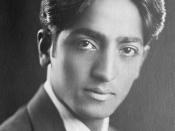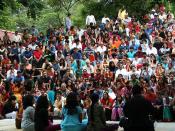Clint Henry
Mr. Z
Extra credit "Freedom from the Known"
The vital need for change and the possibility of it are the essence of what Krishnamurti communicates in the book "Freedom from the Known". Krishnamurti writes, "To understand and to be free of any problem we need a great deal of passionate and sustained energy, not only physical and intellectual energy but an energy that is not dependent on any motive or psychological stimulus or drug."
Krishnamurti shows how people can free themselves radically and immediately from the tyranny of the expected (created by the aforementioned perceptions), regardless of their age--thereby opening the door to transforming their relationships as well as society.
Krishnamurti turns to the nature of human fear, which arises from our social perceptions and offers his own insight.
He also examines an existence of self that lies beyond the made up, second-hand personality that most people identify with.
He does an excellent job at helping us to see the traps that go along with accepting any outside authority as the ultimate truth.
He makes a strong point that by merely "paying attention," we can start to tap into a greater intelligence that we all innately posses. Throughout this work of art, he shows us that by transcending the intellect, the conditioned and programmed self, which is distorted and limited, we experience more clarity, insight, peace, awareness, and realization.
This book has been referred to as radical by some, insightful by others, and still more believe it holds all of the answers. This book, under no dispute, is something new. It offers up something alien to most of us. Granted, he believes to approach the new with something old is never to come upon the new, so to approach this book with any old...


